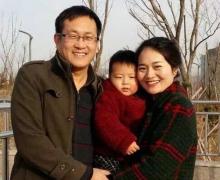- EN
- 中文
 China did not kill Wang Quanzhang, as some feared, but they did their best to break him. Police kidnapped the human rights lawyer in summer 2015 as part of the 709 Crackdown against rights defenders. For the next four years he disappeared inside China’s secretive detention system. This past weekend, his wife, Li Wenzu and their six year-old son, were finally allowed to meet with him. (Read her translated account here). Across the glass in Linyi Prison, Li’s eyes filled with tears as she saw what China had done to her husband. He couldn’t speak properly; he appeared distressed and agitated; he kept avoiding her gaze. He’d dramatically lost weight, his skin had darkened and his front teeth appeared to have moved.
China did not kill Wang Quanzhang, as some feared, but they did their best to break him. Police kidnapped the human rights lawyer in summer 2015 as part of the 709 Crackdown against rights defenders. For the next four years he disappeared inside China’s secretive detention system. This past weekend, his wife, Li Wenzu and their six year-old son, were finally allowed to meet with him. (Read her translated account here). Across the glass in Linyi Prison, Li’s eyes filled with tears as she saw what China had done to her husband. He couldn’t speak properly; he appeared distressed and agitated; he kept avoiding her gaze. He’d dramatically lost weight, his skin had darkened and his front teeth appeared to have moved.
Wang is only in his early 40s. He seemed to have problems with his memory and had written down what he wanted to say to her. Reading from a piece of paper, his words were a frantic warning. He said it would be bad for her and their son if she continued her activism supporting him. Testimony from other 709 Crackdown victims released earlier – for example, fellow lawyers Li Heping and his brother Li Chunfu – confirm they are systematically tortured. This includes forced medication, sleep and food deprivation, beatings, threats to family, and the prolonged use of restraints or stress positions. It is no wonder they kept Wang hidden for so long if only to hide what they had done to him.
10 July 2015: Wang goes into hiding as lawyers are rounded up in 709 Crackdown. 3 August 2015: Police capture Wang and transfer him into Residential Surveillance at a Designated Location (RSDL). Wang effectively disappears for the next few years. 8 January 2016: Wang is formally arrested on suspicion of subversion of state power and transferred to a Tianjin Detention Centre. He is held under a fake name so his family cannot locate him. (For more on this practice see Hidden in Detention: Vanishing Suspects.) July 2018: Family finally finds out that Wang is being held in the detention centre after a lawyer meets with Wang. Despite repeated efforts, including a protest march of 100-plus km by his wife from Beijing to Tianjin, to see him, he is still allowed no visitors. 26 December 2018: Wang is found guilty of subversion of state power at a secret trial. (Read Safeguard Defenders founder Peter Dahlin’s statement on that verdict here.) 28 January 2019: Wang is sentenced to 4.5 years. 28 June 2019: For the first time since July 2015, his wife Li and their young son Wang Quanquan, and Wang’s sister meet with Wang. The meeting lasts for 30 minutes at the prison with guards listening in. Wang is expected to be released next spring.
Wang’s warning to his wife at their short meeting was a signal that she should not ask for any more prison visits. He was asking her to keep silent; to stop her advocacy. He repeated this message again and again. This aspect of their meeting is perhaps the most frightening and the most important. It shows that China is still obsessed with controlling Wang, even though he is helpless in prison. It also hints that Li will likely be blocked from seeing her husband in prison again. The reason Li has not faltered in her activism, and the key reason Safeguard Defenders urges continued pressure by diplomatic missions in Beijing and the media is that continued scrutiny and pressure is Wang’s best hope for better treatment. From Li’s account, Wang seems at breaking point – physically and mentally. He needs all the protection he can get at this stage. Li’s visit makes it clear that her husband, like many of the other disappeared rights defenders, was tortured. Keeping him hidden for so long, a period lengthier than any other victim of the crackdown, indicates that it was likely his treatment was especially harsh.
The authorities were not keen for his state to be made public. He was the last lawyer to be tried in the 709 Crackdown. Such attention and scrutiny – especially from governments and the media – beyond campaigning for his immediate release should be aimed at ensuring he receives humane treatment for the remainder of his sentence, his family and loved ones can visit him, and that he is freely and fairly released when his sentence is completed.
“Four years. Astonishingly, he resembled nothing more than a well-programmed but rather dull wooden man. He didn’t even look back at his own wife and child.” Li Wenzu, 28 June 2019.